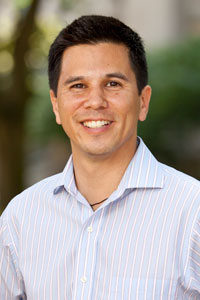News
Stephen Chong is an associate professor of computer science at Harvard SEAS. (Photo by Eliza Grinnell, SEAS Communications.)
Cambridge, Mass. – February 25, 2014 – Stephen Chong, Associate Professor of Computer Science at the Harvard School of Engineering and Applied Sciences (SEAS), has been named a 2014 Alfred P. Sloan Research Fellow.
He is among 126 Fellows, including six others at Harvard, selected from the United States and Canada this year on the basis of their "independent research accomplishments, creativity, and potential to become leaders in the scientific community through their contributions to their field."
The $50,000 award will support Chong's research in the field of language-based information security.
The goal of his research program is to develop tools and techniques that ensure applications handle sensitive information securely. This is challenging, in part because different applications may have very different requirements for handling sensitive information.
"What does it mean for a program to be secure, to handle information in the right way?" he asks. The answer, he explains, very much depends on the program in question. Moreover, this problem won’t be solved simply by building better firewalls or preventing the spread of viruses and other malware. “Even assuming computer systems are safe, how do we make sure that the applications themselves are doing what they’re supposed to?” he asks.
Chong aims to combine mathematics and engineering to create intuitive, meaningful, and efficient software tools to probe these questions. For example, such a tool might assess how information flows through a program, to look for places where confidential information is being directly exposed or where it could be inferred. Another tool might attempt to provide a proof of security—although, as Chong notes, the demand for perfect security must typically be balanced with the need for efficiency and practicality. The best systems, he says, will be more nuanced and expressive, guaranteeing a certain level of security while also meeting the user's needs.
To this end, his ongoing projects include: providing tools that allow programmers to understand how sensitive information flows in their programs, and enforce restrictions if needed; and developing a secure shell scripting language that allows computer users to safely execute programs downloaded from the Internet, such as installation scripts. Chong’s research also overlaps with studies of privacy and cryptography by other faculty at SEAS, and he participates in the National Science Foundation–funded project Privacy Tools for Sharing Research Data. That project will help protect the personal information collected and analyzed in the social sciences, and allow researchers to share data sets without compromising participants' anonymity.
“I'm delighted and honored to receive a Sloan Fellowship,” said Chong. “It's a tremendous encouragement. It provides motivation and support for me and my group to continue to pursue our research agenda.”
“For more than half a century, the Sloan Foundation has been proud to honor the best young scientific minds and support them during a crucial phase of their careers when early funding and recognition can really make a difference,” said Paul L. Joskow, president of the Sloan Foundation, in a statement. “These researchers are pushing the boundaries of scientific knowledge in unprecedented ways.”
The other 2014 Sloan Fellows at Harvard are Emily Balskus (chemistry), John N. Friedman (economics), Richard Hornbeck (economics), Benjamin de Bivort (neuroscience), Daniel Jafferis (physics), and Karin I. Oberg (physics).
Previous Sloan Fellows at SEAS have included Krzysztof Gajos (2013), Vinothan Manoharan (2011), Marko Loncar (2010), Todd Zickler (2008), and Maurice Smith (2007).
Topics: Computer Science, Awards
Cutting-edge science delivered direct to your inbox.
Join the Harvard SEAS mailing list.
Scientist Profiles
Stephen Chong
Gordon McKay Professor of Computer Science




